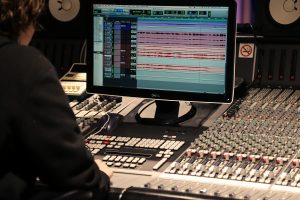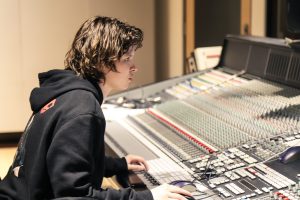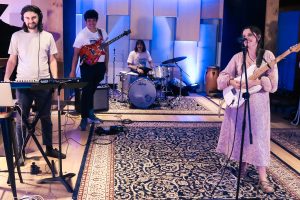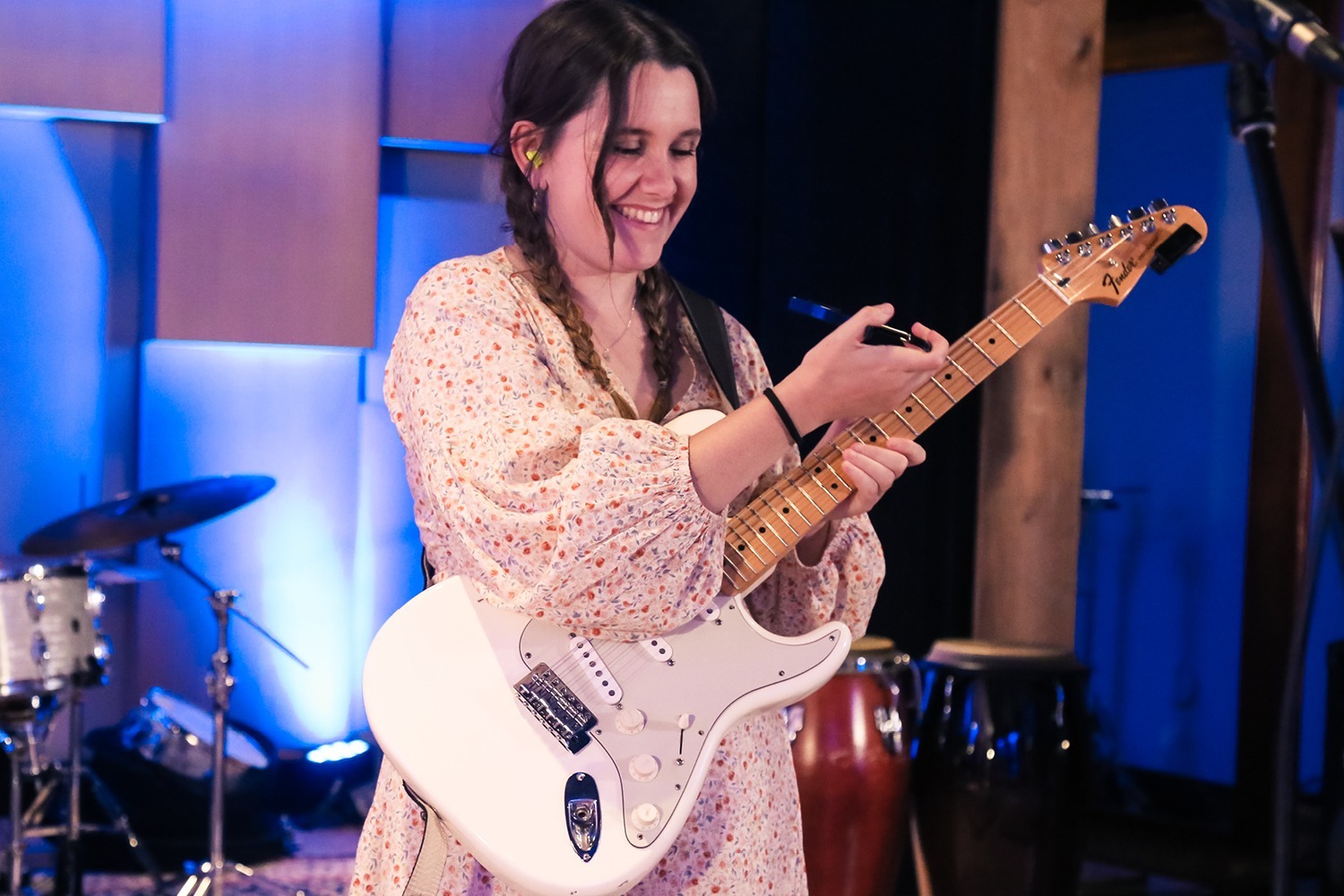We dive into the music industry to discover what success actually involves.
Music is arguably the world’s most universal passion, therefore professions in teaching, performing, producing, composing and engineering music are among the most highly sought – and personally fulfilling – jobs that society has to offer.
The music industry is also incredibly varied, but we spoke to successful artists who’ve worked in almost every discipline and found there are real, common threads throughout their guides to success.
Stay up to date with what’s happening in Melbourne here.
This is their expert advice on how anybody can turn a passion for music into a successful, professional career.
The first step, according to rapper, songwriter, composer and producer Aćol Agaar Apollo, better known by the stage name POOKIE, is inevitably taking the plunge. She surged from “GarageBand level” to critical acclaim after studying a Bachelor of Sound Production in Applied Music at Box Hill Institute. She’s since released a mammoth five singles, an EP and a full-length album since 2020, and credits her rapid rise to making the decision to professionalise her skills.
Dipping your toes into the production pool

“You have to understand, until a year before that degree, I hadn’t ever explored the possibility of becoming a musician myself,” she says.
“It wasn’t a real idea, musicians were like fictional characters to me. Dipping my toes in the production pool, I realised ‘Woah, this is how this can be done.’ It was really exciting, because I feel like I found my thing. The production drew me there. Having access to such facilities really propelled my ability to learn, because I had access to the tools that I needed to grow.
“I was so fresh to the hardware, the production, the synths, the microphones, all the equipment. I felt like a little kid in a candy store. Being able to practice what I’m learning – I was there a lot, I’d go to school and then straight after I’m in the studio, doing my own thing, practising what I learned in class – that’s a lot of good brain activity going on. I didn’t find it hard to ask questions and that’s the key. The fact that you’re learning and they’re teaching you, you’re both working towards that goal.”
Olympia is an ARIA nominated art-pop singer, songwriter and guitarist who’s toured extensively around the world and played at some of Europe’s biggest festivals. She teaches songwriting at Box Hill alongside her recording and touring career, and says because musicians are “responding to the same stimuli”, it’s important they’re taught to see their work in a wider context.
Getting students to think laterally

“If you think that music becomes ubiquitous, because you go to Myer and listen to muzak in the lifts, or Tik Tok, imagine what it would be like creating new visual art if everyone knew how to paint?” she says.
“It’s about listening to different modalities and giving students the tools to think laterally about where their music fits in the world. As an artist coming up, it was all about discovery; learning new instruments, trying out tunings, exploring language and aesthetics.
“They call it throwing mud at the wall to see what sticks. As you get better and you start testing your material out in the public and getting feedback, your feet hit the floor. I speak to young artists and everyone’s writing songs about the postman arriving with parcels, because we’re all in lockdown. But that’s how you get Broken Social Scene’s ‘Lover’s Spit’ – who else has wrote about kissing that way? The key thing is knowing why you want to pursue your art, and your measures of success.”
She says sticking to a strict and prolific routine enables her to conquer writer’s block and direct her creative impulses into productivity.
“I’ll get up at 6am and exercise for 30 minutes, which is non-negotiable,” she explains. “Then I’ll do free-writing for two hours, structured writing for two hours, then guitar practice and song rehearsal.
Going for a walk can shake loose or unknot ideas you have

“Then I’ll have a break, before recording whatever I’ve worked on that night. It’s about continuously cycling through ideas in a very kinetic process. If I get stuck, I’ll go for a walk, or listen to a podcast. The typical day as a songwriter is a really deep dive. Writers walk. The act of walking can really shake loose or unknot ideas you may have. If I’m writing a demo and I get stuck, I go for a walk and usually it will work.”
The first universal factor each artist credited with their success was learning to collaborate. Each one was adamant that transitioning from a bedroom producer or songwriter into a professional artist was only achieved through collaborating with others. Jimi Lloyd Wyatt is the owner and principal producer at Northcote’s epic Ginger Studios, and studied a Bachelor of Applied Music (Music Production) at Box Hill. He says learning to collaborate is vital as a student and a professional.
“Box Hill was great because it forced me to work with other musicians collaboratively on their music, and not on my own, which meant you had to leave your ego at the door and be a team player,” he says. “The group album projects were huge amounts of work that really sharpened up your skills in engineering, producing and communication.
“Instead of telling artists how to make a record, as I stupidly did at the very beginning of my career, I let them guide me by asking lots of questions, listening to their answers and then drawing upon my experience to figure out a fun way of getting them to that vision.”
Melbourne film composer Marlon Grunden, whose work has screened at five Academy Award qualifying festivals, says the skills he learned collaborating at Uni have not only led to the most rewarding aspect of his compositional career, but also informed his own personal electronic project, Bobby Bége.
The challenge of working within boundaries and constraints

“Sometimes I don’t have the full picture – the director or creator has the vision – so you have to have a lot of restraint,” he says. “But I love working within boundaries and constraints. It’s part of the challenge to work within a set of rules. The director likes this instrument, so I have to pepper it in places they won’t expect.
“Self-restraint is integral to making music. Nowadays we make music on a computer, where we have an entire orchestra of sounds and whatever we want, and we’re not limited by tracks and players. But I self-impose those rules so I can create, otherwise the result is a big wash of nothing.”
He strongly believes that working with others allows young artists to escape the sense of perfectionism that can paralyse them.
“Literally every single time I’ve put pen to paper or put notes into the computer, there’s always stuff that I want to re-look at or re-tweak,” he continues. “I just finished a feature film and watching it I thought, ‘I wish we could re-do this and that’ but as an artist it’s really hard to realise when something is finished.
“Making music is such a collaborative art, it’s impossible to do it in a vacuum. It comes back to interpersonal skills, I have to be very decisive when I’m working with deadlines, so I need to be able to create something that isn’t my little baby.”
Ideal preparation for transitioning to a recording artist

Box Hill’s Creative Cup competition challenges its music, music business, design, photography and fashion students to write, produce and record a song, be styled for photoshoots, develop album art and media assets, and develop a release strategy in just four days. POOKIE says the collaborative skills she developed during this time eventually became the ideal preparation for transitioning to a recording artist.
“It was really cool for the students to be able to collaborate, and the people I formed relationships with, we all have access to each other now on social media, and you know everyone’s there,” she explains.
“I learned to just charge forward, make it. At the beginning it was just me producing and rapping in my bedroom, and now I’m working with a whole range of people on creating my music. It was really nice learning to not be afraid of collaboration. It’s opened me up a lot.”
“It just feels like a very caring environment,” Olympia adds. “Everyone’s really passionate about music and there’s some incredible experience there. It’s pretty mind blowing.
“When we’re creating something out of nothing, the path isn’t clear, so it’s really important to work with people who understand empathy, because it’s such an important part of being an artist. Tapping into a supportive community like Box Hill is incredibly important for that reason.”
Using professional equipment of an incredibly high standard

As we spoke to artist after artist, the facilities that young musicians have access to constantly came up throughout each conversation. Olympia says using professional equipment of an incredibly high standard often results in a paradigm shift in the way her students view their own work.
“It’s a really important step when you’re writing songs to hear your work back,” she notes. “It’s confronting. There’s a big difference sometimes between where we think we are, and where we actually are. The higher quality recordings you can get access to earlier on, you’re really hearing it and I’ll sit there with young students that I’m mentoring and they’ll say ‘Oh, this sounds terrible.’
“It’s because they’ve never heard themselves in such high definition before, and it doesn’t mean we all need to make high-def records, but it’s a very healthy step in learning. Then you can say, ‘Okay, what do I need to do differently?’
“I’m a recording and touring artist myself, but I can’t believe how good the facilities are at Box Hill,” she added. “To offer an SSL desk – there’s not many of them in the world – I’m probably their biggest fan in terms of the equipment they have. They have incredible rehearsal rooms and recording facilities with two major recording studios. There’s a lot of attention to detail there.”
“At Box Hill, as a student between 2004 and 2006, they had state-of-the-art facilities when I went through the school,” Wyatt says. “When Box Hill did their major upgrade a few years ago, the facilities were once again the pinnacle of education in the Australian music industry, especially because they really went all in on the acoustic design this time.
Bringing the best to music education for students
“That says a lot about Box Hill,” he continues, “they really believe in bringing the best to music education, by having the best for students to work with. Which other university in Australia do you know that will let students get behind a vintage U47… two of them mind you?”
When asked about the advice they’d give to someone right at the beginning of their musical journey, their responses reflected an entire range of concerns.
Young musicians face the daunting prospect of creating original art, self-promoting, forming technical expertise, and collaborating with everyone from record labels to tour promoters. Yet from people who’ve done it all, and succeeded, their advice was deceptively simple, and reassuring. For them, turning music into a profession, never affected their passion.
“There’s definitely pressure to self-promote because we live in such a fast society where you feel like you have to push all the time,” POOKIE says. “I realised that I shouldn’t worry about that, I only need to worry about what I’m doing. Honestly, I wasn’t always like that: there’s something about music that specifically excites me. I’m curious, so I’m going to do what I can to explore.”
“I’ve written through a whole range of emotions,” Grunden added. “But I definitely have a particular story to tell through the way I write music and the instruments I use. When I went into my Bachelor of Music (Composition) degree at Box Hill, I learned all of the technical information from scratch. What you really need is just a love of the media, and a love of creating and people.”
“The first semester is a bit daunting because it is such a step up for most students,” Wyatt concluded. “Box Hill demands a really high level, but they’ll do everything to help you get there so stick with it and you’ll be fine.
“Just ask for help.”
Visit the Box Hill Institute’s website for more information on becoming qualified to work in a variety of jobs in the music industry.







